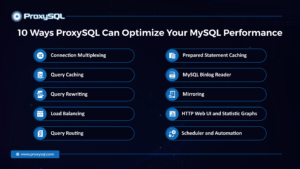
MySQL is a widely used database management tool; however, as your application grows, maintaining optimal performance may become more challenging.
Thankfully, ProxySQL provides many features that can help optimize MySQL performance and functions as a high-performance MySQL proxy. Let us understand the scope of improvement and how you can optimize MySQL performance using the powerful ProxySQL.
The Challenge of MySQL Performance
MySQL can face performance challenges under heavy load or complex query workloads. Conventional optimization techniques often reach their limits, necessitating additional strategies. Under such circumstances, ProxySQL can address these challenges and significantly enhance MySQL performance.
ProxySQL is a high-performance open-source SQL proxy that organizations can use to optimize the MySQL database performance.
10 Ways ProxySQL Can Optimize Your MySQL Performance

Below are the 10 ways ProxySQL can optimize MySQL performance:
1. Connection Multiplexing
Connection multiplexing is one of ProxySQL’s most notable features. MySQL’s “thread per connection” model divides database connections into threads by default. An increase in connections can result in performance degradation and significant resource consumption.
ProxySQL reduces performance degradation by using a thread pool to let several front-end connections share a backend database connection. The significant decrease in the resources required for connection management enhances performance, particularly in high-concurrency environments.
ProxySQL tracks session-specific variables with connection multiplexing to determine whether multiple frontend connections can share a backend connection. This means that although multiplex connections are often feasible, there are scenarios where disabling them might be necessary, such as when preserving session-specific states.
2. Query Caching
Query caching is another powerful feature of ProxySQL that can significantly boost MySQL performance. ProxySQL query cache stores the result of queries so that subsequent identical queries can be served directly from the cache, bypassing the need for MySQL to execute them again. Storing the queries reduces the load on the MySQL server, decreases latency, and speeds up response times.
ProxySQL’s query cache is highly customizable. You can configure caching rules based on specific query patterns, enabling caching for only the most resource-intensive queries while excluding others. You can also configure the cache to expire after a certain period, ensuring the database doesn’t return outdated data
3. Query Rewriting
Query rewriting is a feature in ProxySQL that allows you to modify queries on the fly before they reach the MySQL server. Rewriting is particularly useful for optimizing poorly written queries or applying specific optimizations without changing the application code.
For example, you can rewrite SELECT * queries to fetch only the necessary columns or convert complex joins into more efficient query forms.
By rewriting queries, you can ensure that your MySQL server processes queries more efficiently, reducing CPU and memory usage and ultimately speeding up query execution times.
4. Load Balancing
ProxySQL is particularly good at load balancing. It divides incoming queries among several MySQL servers so that no one server becomes a bottleneck. You can set up ProxySQL to distribute queries according to several parameters, including the least connections, round-robin, and query type. By doing this, you can maximize the utilization of your MySQL resources and ensure high availability even in the event of peak loads.
When your application’s demand increases, load balancing allows you to scale horizontally by adding more MySQL servers to the pool. ProxySQL distributes queries automatically, which facilitates maintaining peak performance
5. Query Routing
In addition to load balancing, ProxySQL offers advanced query routing capabilities. You can define rules to route specific queries to different MySQL servers based on the query type, content, or even session variables.
For instance, you might route all read queries to a read replica while directing write queries to the source server.
Query routing is particularly useful in a replication environment where read replicas are used to offload read operations from the master. By ensuring that replicas serve read queries, you reduce the source’s load, allowing it to handle the write operations more efficiently
6. Prepared Statement Caching
Prepared statements are precompiled SQL queries that can be executed multiple times with different parameters. MySQL supports prepared statements, but compiling them repeatedly can be resource-intensive. ProxySQL’s prepared statement caching feature stores these compiled statements, allowing you to reuse them without recompilation.
By caching prepared statements, ProxySQL reduces the overhead associated with repeated query compilation, improving performance, especially for applications that frequently execute the same types of queries with different parameters.
7. MySQL Binlog Reader
Starting from version 2.0, ProxySQL introduced the MySQL Binlog Reader. This feature allows it to track executed Global Transaction Identifiers (GTIDs) in real-time from all MySQL servers in a replication topology. Tracking GTIDs in real time enables ProxySQL to perform adaptive query routing based on GTID tracking, ensuring that read queries are routed to the appropriate replica that has already executed the necessary transactions.
The MySQL Binlog Reader enhances performance by ensuring causal consistency in read operations. Consistency means that read queries are always executed on a server with the most up-to-date data, reducing the chances of serving stale data and improving the accuracy of query results.
8. Mirroring
In ProxySQL, mirroring enables you to duplicate queries across several backend servers. Mirroring helps to replicate data between databases without affecting the speed of your central database, which is helpful for testing purposes.
For instance, you can mirror production traffic to a staging environment to test new features in an actual setting.
Mirroring adds overhead, but it is a valuable tool for testing performance and ensuring your database system is stable enough to support real-world traffic
9. HTTP Web UI and Statistic Graphs
ProxySQL provides an HTTP-based web UI that includes various statistical graphs. These graphs offer insights into metrics, such as connection counts, query performance, and server load.
By analyzing these metrics, you can identify performance bottlenecks and make informed decisions about optimizing your MySQL environment.
The web UI also allows you to manage and configure ProxySQL in real-time, making it easier to implement changes and see their impact immediately.
10. Scheduler and Automation
ProxySQL includes a built-in scheduler that automates tasks, such as query optimization, cache purging, and server health checks. You can write custom scripts to execute at specific intervals and help maintain optimal performance without manual intervention.
Automation through the scheduler ensures that your MySQL environment remains fine-tuned, reducing the risk of performance degradation over time. You can focus on more strategic optimizations and improvements by automating routine tasks.
Implementing these top 10 strategies can ensure that your MySQL environment stays responsive and effective and can easily handle growing workloads. Regardless of the size of your application or enterprise system, ProxySQL offers the resources you need to maximize MySQL performance and give your users an improved experience.
Optimize Your MySQL’s Performance Now with ProxySQL!

Ready to unlock the full potential of your MySQL databases? Implement ProxySQL today and start optimizing your performance with these powerful strategies. Whether you’re looking to improve query execution, balance loads more efficiently, or automate routine tasks, ProxySQL offers the tools to scale confidently.
Don’t wait—enhance your MySQL performance now and deliver a faster, more reliable experience for your users. Contact us and see the difference it can make in your database operations!